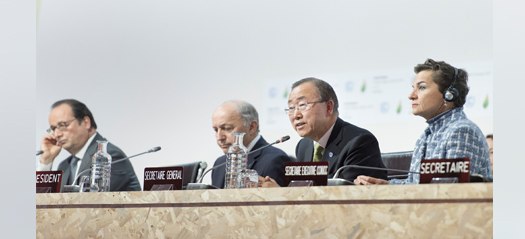
François Hollande, President of France; Laurent Fabius, Minister for Foreign Affairs of France and President of COP21; UN Secretary-General Ban Ki-moon; and Christiana Figueres, Executive Secretary of the UNFCCC addresses the Comité de Paris at the UN COP21 on December 12, 2015. (Credit: Mark Garten/UN)
As the climate crisis becomes direr, some world leaders are pledging to meet their country’s emissions goals earlier than their Paris Agreement targets. Prime Minister, Boris Johnson, announced on June 30 that his Government would, “remove unabated coal from the UK’s energy mix” by 2024, a year earlier than previously agreed.
In 2020, coal accounted for just 1.8 per cent of the UK’s energy mix, down from 40 per cent in 2012. Ahead of the COP26 summit in Glasgow later this year, Johnson is doing everything he can to show the UK’s leadership on climate, as he tries to instil confidence in a post-Brexit Britain.
Environmental groups have questioned how realistic Johnson’s climate targets are, claiming that the Prime Minister lacks strategy.
The New York Times reported that the Committee on Climate Change called for tax incentives as well as, “dedicated Government spending to reduce emissions from industry, buildings and agriculture, and a bigger effort to point out the opportunities offered to people and businesses by tackling climate change.”
Transportation is the next major area of the economy to confront and will require infrastructure investment for electric vehicle charging stations.
Where other big polluters stand
China
When the Paris Agreement was being drafted, it gave some leeway to developing countries like India and China, allowing them to reach peak emissions further down the line. China, the world’s largest greenhouse gas emitter, did not have to reach peak emissions until 2030, according to the agreement.
Though the country is in the process of unveiling new coal-fired power plants, they announced last September that they aim to reach peak emissions before 2030 and carbon neutrality by 2060.
The country has invested heavily in renewables, but continues to bolster its fossil fuel industries.
China recently announced a climate “leaders group” to monitor the country’s progress on meeting climate targets.
The group consists of high-level ministers from sectors including construction, industry and IT, natural resources, transport, commerce, and a leader in tax policy. President Xi Jinping is on track to make China the world’s largest economy.
His authoritarian tactics make meeting goals easier, as the bureaucracy and politics that come with elections do not stand in the way of creating policy that leads to tangible results in record time.
The US
At his speech at the US Climate Summit in April, President Joe Biden urged nations to speed up their climate goals. The US’s Paris goals aimed for a 26-28 per cent reduction below 2005 levels by 2025, but Biden announced at the summit that the country would aim for a 50-52 per cent reduction by 2030.
The US president is trying to show leadership on climate again after his predecessor removed the country from the Paris Agreement in 2016, to the dismay of world leaders. Biden’s recently announced infrastructure plan had to omit his more ambitious climate mitigation efforts in order to get bi-partisan support, but it does set aside funds for public transit, freight rail and electric vehicle charging stations.
Australia
Australia is one major western power lagging behind on its climate commitments. After being urged to aim for higher emissions reductions targets at the Leaders Climate Summit, Australia’s Prime Minister, Scott Morrison, decided to stick with his country’s goal of reaching 26-28% reductions below 2005 levels by 2030.
According to Climate Action Tracker, Australia is using the pandemic recovery as an excuse to continue expanding the gas industry.
The BBC reported that the country has warmed 1.4C since 1910, and UNESCO is debating whether to put the Great Barrier Reef on its list of endangered world heritage sites.
The reef has seen unprecedented levels of coral bleaching, which occurs when water temperatures warm and coral expel the algae living on their tissues, causing the coral to turn white.
This affects the ecosystem’s reproductive capabilities and makes them vulnerable to disease. Australia is urging UNESCO to keep the reef off the list, as it seeks to strengthen its economy through tourism after the pandemic.
In February, the United Nations Framework Convention on Climate Change (UNFCCC) released a report stating that the world was not on track to meet its Paris Agreement goals of keeping temperatures below 2C (and preferably below 1.5C) compared to pre-industrial levels. The Nationally Determined Contributions (NDCs) Synthesis Report included reports by 75 nations that covered 30 per cent of GHG emissions.
The report does not reflect an overall picture of climate health because of how many of the world’s major emitters were left out of it, but it expressed how many nations are struggling financially with climate adaptation projects, especially amid their recovery from Covid-19.
Before COP26, UNFCCC intends to release a more comprehensive report. Many countries seem eager to invest in emissions reducing infrastructure plans, while continuing to bolster polluting industries as well.
The “economy first” recovery from Covid-19 may mean that Paris Agreement goals are not met on time; still, the world’s largest polluters can influence other nations by continuing to focus on their emissions’ reduction plans.
Sarah Sakeena Marshall,
Grit Daily Staff Writer, The Muslim News Environmental Columnist